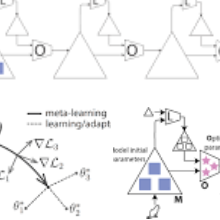In recent years, various machine learning (ML) solutions have been developed to solve resource management, interference management, autonomy, and decision-making problems in non-wireless and wireless networks. Standard ML approaches require collecting data at a central server for training, which cannot preserve the data privacy of devices. To address this issue, federated learning (FL) is an effective method to allow edge devices to collaboratively train ML models without sharing local datasets for data privacy. Typically, FL focuses on learning a global model for a given task and all devices and hence cannot adapt the model to devices with different data distributions. In such cases, meta learning can be employed to adapt learning models to different data distributions using a few data samples. In this tutorial, we conduct a comprehensive review on FL, meta learning, and federated meta learning (FedMeta). Compared to other tutorial papers, our objective is to leverage how FL/meta-learning/FedMeta can be designed, optimized, and evolved over non-wireless and wireless networks. Furthermore, we analyze not only the relationship among these learning algorithms but also their advantages and disadvantages in real-world applications.
翻译:近年来,开发了各种机器学习(ML)解决方案,以解决非无线和无线网络中的资源管理、干扰管理、自主和决策问题。标准ML方法要求在中央服务器上收集数据,用于培训,无法保护设备的数据隐私。为解决这一问题,联邦学习(FL)是一种有效的方法,使边际设备能够合作培训ML模型,而不必共享本地数据套件以维护数据隐私。通常,FL侧重于为特定任务和所有设备学习一个全球模型,因此无法使模型适应不同数据分布装置。在这种情况下,可以使用元学习,利用少数数据样本使学习模式适应不同数据分布。在这个教程中,我们全面审查了FL、元学习和联合元学习(FedMeta)。与其他辅导文件相比,我们的目标是利用FL/meta学习/FedMeta如何设计、优化和演变超越非无线和无线网络。此外,我们不仅分析这些学习算法之间的关系,而且还分析这些实际应用中的优势和劣势。




